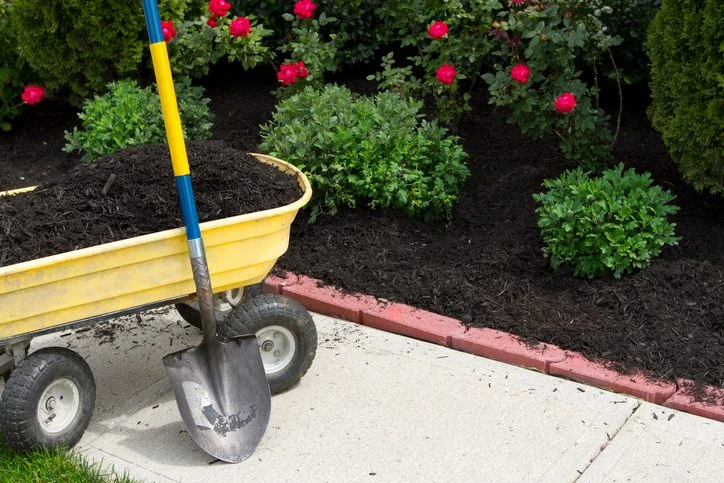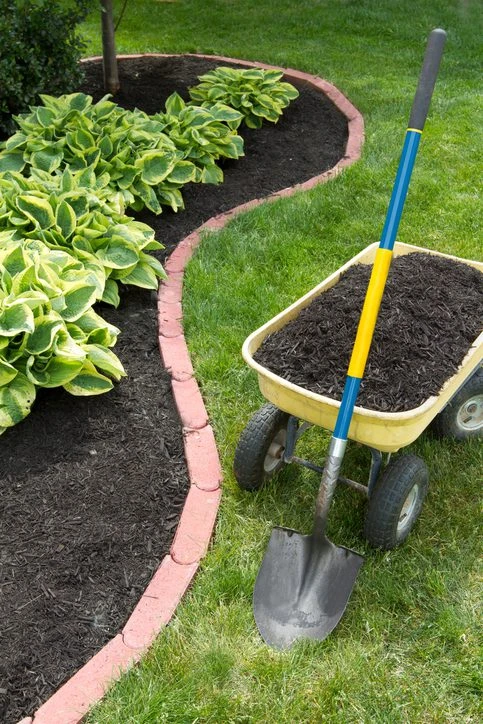We made this helpful guide on how to mulch a garden for success because when it comes to mulching your garden bed in Seattle, the options for mulching materials seem endless. There truly are good and bad types of mulch. Depending on where you live and the amount of sunlight and water run-off the area gets, the difference can be extremely important. New Life Rockeries has been making gardens look great for over 30 years!
Why does knowing how to mulch a garden matter?
Using a good mulch is important because it helps stabilize the soil and can prevent erosion. A stabilized soil helps retain moisture, which improves the soil’s structure over time.

Perhaps the best thing about a good mulch is that it prevents weed growth, which we all know is the most annoying aspect of keeping a garden! When good mulch is used and applied properly, it can act as an organic herbicide and be used in place of chemicals or extra cutting around the garden area.
What are the types of good mulch?
- Bark Mulch: Bark mulch is great because it provides proper drainage and ventilation for the plants. It also has a beautiful rich color that doesn’t fade over time, making it a lovely background for your plants.
- Soil Conditioner: Soil conditioner is a product that is added to the soil to improve its physical qualities as well as provide nutrition to the plants. You can use this on the top of the beds or in a plant mix.
- Straw Mulch: Straw is not a good option for use in the Pacific Northwest, thanks to our wet weather. Straw absorbs water and is prone to mold growth — which is NOT good for your garden.
 Cocoa Bark: This is a lovely bark mulch option. The color and scent of the cocoa bark (especially after a rain!) keep people buying it, despite being slightly more expensive than other options.
Cocoa Bark: This is a lovely bark mulch option. The color and scent of the cocoa bark (especially after a rain!) keep people buying it, despite being slightly more expensive than other options.
- Living Mulch: A common type of living mulch is ivy. Living mulches don’t need to be replaced every season, although over time they may need to be cut back if they begin to compete with the rest of your garden plants.
- Peat Moss: Peat moss is a fibrous material that forms when moss decomposes in peat bogs. Acid-loving plants like blueberries and camellias love peat moss, but more alkaline plants might do better with compost instead.
- Leaves/Organic matter: A simple and cost-effective way to mulch your garden is with the leaves from your yard! Many people remove fallen leaves from their yards, preferring a clean, uncluttered look. These leaves can be gathered and then used to mulch garden beds. Not only is this to prevent weed growth, but those fallen leaves also provide nutrients for the soil as they decay over the winter.
- Compost Mulch: Using compost that you create yourself is fantastic because it’s free! It has the same benefits as regular mulches and adds more nutrients to the soil below.
- Stone Mulch: Stone mulch is a long-lasting type of mulch and is great for alkaline gardens or places where heavy rains are prevalent.
Once you’ve determined which type of mulch (or perhaps you will decide to use multiple, depending on your garden type) you will need to tackle a few tasks before laying it down. First, you need to pull or kill all the weeds that are in the area you’re about to mulch. While mulch is designed to keep the weeds from coming up, it usually won’t get rid of the ones that are already there.
Once you’ve done that, it’s smart to trim any bushes or trees in the area. After this, rake up any leaves or twigs that have fallen in or around your garden bed. Then it’s time to edge the area you are going to compost (if that’s not already completed) and then fill in the area with your desired mulch!
Knowing these simple and easy to follow steps will help you to know how to mulch a garden bed with ease. If you have any questions or concerns about the different types of mulch, feel free to refer back to this article or even reach out to us and we’ll help you out right away!
You have mulched your garden properly!
We hope this tutorial on how to mulch a garden has helped you with your next project. Be confident knowing you did the job right.
If you’ve got a rockery, retaining wall, or landscaped lawn and have questions about mulch or anything more, please reach out to us at New Life Rockeries today. We can help you with all your landscaping needs in the Greater Seattle Area. Contact us by filling out our contact form today for a free estimate today!
